Executive Summary
The rationale of this dissertation is to develop an understanding of how corporate social responsibility affects the profit of the company in America and how oil companies can handle critical incidents connected to CSR by enforcing their integrated short-term and long-term social responsibility. This paper will focus on the background of the problem, rationale of the research, scope of the study, literature review on CSR, and the role of CSR in profit, and so on. However, research methodology concentrates on the quantitative data collection process, research approach, data analysis process, and questionnaire design.
Introduction
Background of Study
The main objective of this dissertation is to discuss how corporate social responsibility (CSR) affects the profit of the company in America. However, CSR is one of the most highlighted issues for businesses all over the world as the notion is vital for brand value and business growth (Vaaland & Heide, 2007).
They further added that CSR has an impact on the profit of the company when the company makes long-term investments to maintain its relations with society, faces a challenge with the corporate reputation, buildup public image, and maintains a good track record. However, in the case of the US oil industry, CSR becomes a crucial issue for the profit maximization of the company while the oil company is severely affected by sudden critical events, unforeseen, and negative incidents, or global warming caused by the production, local air, and water, or create threats for public health.
Research Question and Objectives
This dissertation is designed to investigate, how Corporate Social responsibility affects the profit of the companies in America? To extremely configure the aim, the dissertation has been designed to respond to the subsequent research questions; the answer to this question would enable the legislators and regulating authority to organize the policy and towards a greater motivation for increased confidence of corporate social responsibility. Three research objectives are listed below:
- What is the Role of Corporate Social Responsibility in Profit-Making Organizations?
- What is the Historical background of Corporate Social Responsibility in America?
- How Corporate Social Responsibility and Its Affects on Profit?
All of these above issues of CRS practice at US oil companies will assess under certain considerations along with theoretical background and these tasks are significant since each of those issues are closely interrelated with the scenario of the said American Oil Companies and their performance of corporate social responsibility.
Rationale for the research
Many scholars tried to find out the solution to the question of how corporate social responsibility affects the profit of the company in America and how CSR influence the stability and stakeholders’ confidence from last era. Most of the contemporary researchers have concentrated on the corporate governance and regulatory reforms but no overarching research agenda has yet been proposed on the direct effect of CSR on the profitability of Oil companies.
Boasson (2008) argued that that the oil companies were the pioneer to integrate the concept of CSR and it has evidenced that CRS instrumentation in this sector has greater significance in the American economy though the industry has been passing through a number of challenges with environmental sustainability as well as climate change. Thus, it is rational to investigate how corporate social responsibility affecting the profit of the company in America Through this investigation, the oil companies will get a potential motivation to invest on environmental sustainability and get a better level of shareholder’s confidence, which will provide the companies a practical advantage over their CSR engagement and the legislators will get further direction for policy making.
Limitations of the project
In order to organize the paper the researcher has suffered numerous problems like –
- Some point of the instruction was complicated to follow due to unavailability of proper sources because corporate social responsibility is most common issue now a days but how CSR is affecting on the profit is a vast area;
- The number of words was not sufficient to cover every aspect of the research with proper outcomes;
- Moreover, time limit was really a big problem for the researcher as there are too many issues involved in this topic;
- Conducting primary research was the major challenge for the research as the employees of US oil industry were not aware about the actual scenario and the management were too busy to fill up the questionnaire;
- However, the budget was too short to conduct this research;
- At the same time, lack of the topic related secondary data was one of the main challenge to co-ordinate the research though there are huge secondary data available on the CSR related issue;
Scopes of the study
This is an exceptional theme that investigate the affect of CSR on business profit of US oil industry, so it has number of scopes to consider –
- This paper has the opportunity to research on the CSR setback for British Petroleum from the recent environmental and economic disaster for the Gulf of Mexico region;
- It has also scope how CSR effects on the share price of the company, reputation, confidence and profit of the oil company, for example, the stock price of BP has lost about 15% since the start of the oil spill;
- Not only economical or environmental issues, CSR has great impact on the confidence of the employees; as a result this paper will concentrate on those aspects;
- On the other hand, failures of CSR in the US Oil Industry are also equally spotted besides the affect of CSR on profit.
Literature Review
The Role of Corporate Social Responsibility in Profit Making Organizations
Carroll (1999) argued that corporate social responsibility is the route of assessing an organization’s impact on society and evaluating their responsibilities; it begins with an appraisal of a company and their customers, suppliers, environment, communities, and employees. Montiel (2008) suggested that CSR is sustainable and it involves activities that a business can maintain without adversely affecting the business goals; CSR is about more than environmental responsibility or having a recycling policy- it is about considering the whole picture, from the internal processes to the clients, taking in every step that the business takes throughout everyday operations.
According to Carroll (1999), CSR is a long-standing approach to companies that addresses the requirements of different business stakeholders providing frameworks for successful a venture that is harmonious with its surroundings; it is an opportunity to engender sincere, reliable, and memorable chronicles that a business and its community can feel proud about.
CSR is a long-lasting promise by an organization to act fairly and contribute to economic improvement by enhancing the living standards of the personnel and their families together with the neighboring population and society at large; more concisely, it is about how organizations deal with the business processes to construct a general positive impact on society(Young & Thyil 2009). According to Kapoor & Sandhu (2010) In recent times, businesses are responsible for their actions like never before; therefore, CSR should be sustainable and it should stay as an essential element of a company in spite of altering fates; most importantly, consumers more and more do not accept immoral business practices or corporations who operate recklessly.
Sen & Swierczek (2007) suggested that researchers have divided CSR into numerous groupings and normally the motives are the objectives for separating CSR into different categories; these are generally based on, for instance, corporate citizenship, corporate constitutionalism, corporate supremacy, political power, kind of effects, corporate morals, legislations, influential principles, public demand and many more.
CSR is not a use up of resources, because carefully executed CSR policies can help a company to augment consumer retention, to expand and improve relationships with suppliers and networks, to attract, preserve and maintain a cheerful workforce and be an Employer of Choice, and to accumulate cash on energy and operating expenses and handle risk. It also helps a company to distinguish itself from the rivals, to cause invention and learning and boost the company’s power, to improve the business status and repute, to offer entrance to investment and funding facilities, and to create optimistic promotion and media options owing to media interest in moral corporate behavior (Kapoor & Sandhu 2010).
According to Husted, Allen, & Rivera (2010), nearly every company contends on either price, level of quality, or service as their competitive advantage, whereas non-profit organizations often use competence, ethics of service, or social advantage to create their competitive advantage. However, on these days, contending on further economic, ecological, or societal benefit that can be used for competitive purposes, for example, communal assistance, better brand identity, diminution of waste removal costs or healthier employee working environment are the imperative features of competitive advantages that a profit making company can achieve (Husted, Allen, & Rivera 2010).
At present customers, shareholders, governments, and even staffs have become more refined and more attentive about good corporate behavior; in this new business atmosphere, therefore, an organization’s repute has become one of the main precious assets, and nothing rather than CSR can contribute to such achievements of corporate reputation. Optimistic CSR experiences construct confidence and goodwill among stakeholders and many businesses have developed apparent CSR efforts as strategic planning and managerial approach in attaining successful outcomes; the numbers of such businesses continue to grow as good CSR policies drive corporate change.
Through well-defined goals and assessable targets, a company’s CSR policy can offer the groundwork for steps towards operating a more sustainable and fair business, which begins with an assessment of every single aspect of the business, its operations, its impacts on workers, suppliers, clients, and localities.
History of Corporate Social Responsibility
Whilst the term CSR seems to be comparatively new to the corporate world, history reveals that the evolution of the concept itself has taken place before several decades; the fact that the terminology itself has changed means that the sense attributed to concepts such as CSR will persist to evolve together with business, political and social developments. According to the Corporate Watch (2010), the augmentation of the anti corporate activism on ecological and human rights concerns caused a massive change in corporate approach to societal and ecological matters.
The anti corporate counterattack kept on to increase day-by-day, which arrived at a high point in 1995, when the limelight turned on Shell- that year the business stood accused of involvement in the implementation of Ken Saro Wiwa and 8 other campaigners in Nigeria, and harassed by Greenpeace over the resolution to sink the Brent Spar oil platform (Manby 2000).
Immediately, Shell lose the reliance of its shareholders and the consumers and awaken thousands of profit making organizations throughout the corporate world about the significance of public-reputations and the capacity of activists to harm that; therefore, a strategy to convince the public that corporations played an important and meaningful role in society was essential. Private enterprises required a radical change to step forward to CSR; Shell, later on, turned into the first large business to bring out a CSR report.
Therefore, corporate social responsibility emerged like a direct response by businesses to remove corporate activism and scratches over the reputation caused by campaigns; CSR now represents a success for businesses in reviving their public-image and settling the issue space around the social and environmental impacts of businesses. Tom Delfgaauw, ex- vice-president for sustainable-development at Shell, depicted that that incident at the company was an outstanding thing and that the disaster gave the company rather with more affluence; firstly, the company has emerged out of that crisis as a greatly well built one, and secondly, since the disaster has caused a tremendous speed-up in its regular commercial progresses.
Corporate Social Responsibility and Its Affects on Profit
Tsoutsour (2004) argued that CSR is not a clearly defined area of research and neither is it a clear construction of organizational practice; the elementary idea behind CSR is that business has a commitment to work for social betterment; this obligation acts as a constant function of the company’s operations. CSR is in an emergent phase and it acts as an umbrella for many such related concepts; it is still an embryonic and contestable concept and the call for CSR has been justified by researchers on different grounds using financial, tactical, legalistic, and moral arguments; moreover, the financial performance of socially responsible organizations are far better than the other competitors.
As per Godfrey, Hatch, & Hansen (2010), businesses’ target always involves a profit motive, as they would by no means survive if the shareholders do not receive beneficial return on their investment; different ways to acquire profit relies on the business’s focus, and its stakeholders are significant for a long standing profit orientation. As a starting point for proper categorization of CSR is it appropriate to concentrate on economics, ethics, politics, and social integration- this theory is stimulated and entrenched in features that can be observed in any social system, for example, acclimatizing to the atmosphere, target achievement, and social integration.
This perception indicates that CSR have either an economic focus with a profit-motive or a moral focus with a commitment for social betterment motive; this “either-or” perception polarizes the argument and distracts attention from the space where economics and ethics congregate and where potential solutions exists (Godfrey, Hatch, & Hansen 2010).
As per Roman, Hayibor, & Agle (1999), businesses are now considering corporate social responsibility as a growth opportunity rather than just a regulatory compliance or charitable endeavor; most of the businesses are now concentrating on CSR actions to generate new profit streams, and more than half considers that CSR has already provided them with an advantage over their competitors. There are a number of reasons for which organizations believe CSR to maximize profits; for example, the growing consciousness among customers lead them to use the internet to familiarize themselves with a wide-range of ecological and social issues, consequently, they come to know about the CSR practices of different businesses- this acts as a promotional element to raise the sales.
The US businesses continued to address the issue of CSR and its effects on financial performance; amongst the five-hundred biggest US public corporations, 26.8 percent consigns in annual reports to ethical-behavior to stakeholders or conformity with the commercial code of conduct. It is arguable that the businesses that conform to the corporate code of conduct or have regard to CSR use to have better financial performance than businesses that do not correspond to CSR (Roman, Hayibor, & Agle 1999).
Nevertheless, this is an extremely constricted dimension of CSR and it lacks the fact that businesses like Enron can connect with generosity whilst being blameworthy of ethical delinquency (the Enron humiliation exposed in October 2001, which ultimately led to the bankruptcy of the business). Thomas & Nowak (2006) suggests that the Enron crumple is a reminder that the divergence between social liability and profit making is not at all far-off in an increasingly spirited scenario of international commercial practices.
Thomas & Nowak (2006) also argued that there is an optimistic connection between corporate social performance (CSP) and corporate financial performance; the CSP in fact lowers the monetary risks, which a company might face in future due to its unethical behavior. Businesses of every level could take financial advantage by gaining extra profit from socially responsible activities; whilst it is tough to demonstrate the underlying relation between CSR proceedings and profits, a comprehensive benefit-cost analysis of CSR by Cooperative Bank of the UK affirmed that between fifteen to eighteen percent of pre-tax profits unswervingly comes from a business’s moral posture.
However, people’s buying of shares is not significantly affected by the corporation’s level of social responsibility and CSR status does not essentially influence a corporation’s share price; certainly, share market price is the only measure of profitability and it is assumed that, definition, measurement, and data problems exist for assessing social responsibility and financial performance (Orlitzky, Schmidt, & Rynes 2003). According to Orlitzky, Schmidt, & Rynes (2003) when it comes to corporate financial investment in CSR, it has assumed that there is some point of CSR, which could increase profits whilst fulfilling the demand for CSR arising from numerous stakeholders; in addition, cost-benefit analysis can determine the ideal level of CSR.
In fact, CSR agendas do not go far enough to gratify the hopes of international populace in proper sense; as companies are profit-seeking organizations, their core function is to achieve profitability. As per Mahon & Griffin (1999) in past couple of decades, a number of huge companies suffered from extreme brand spoil because of pitiable moral performances; for instance, companies like Nike by exploiting Child Labor, ExxonMobil by Alaskan Oil Spill, and several few cases more like that. Such damages to brand name frequently caused considerable losses to those companies, which in turn adversely influenced profitability; as a result, the share prices went down (Mahon & Griffin 1999).
A corporate CSR strategy cements corporate accountability to shareholders and corporate accountability to all other stakeholders; CSR is an essential element of a successful and sustainable business strategy, forestalling social and ecological troubles whilst optimizing circumstances for long-term profitability; it is a link between enterprising, profit-making and social development- the more organic this link, the more long-term profit is made.
The inter relationship between business and society is analytically managed on the foundation of CSR study which assists to guide the understanding of crucial conditions for long-term money-making organization, accordingly, CSR is an integrated management instrument for long-term prosperity and progress whilst supporting short-term targets in the areas of government associations and corporate communications.
Research Methodology
Introduction
The fundamental objective of this chapter is to present how the research would be organized and which approach would be applied in order to formulate this dissertation. The researcher would proceed with the six steps of Malhotra in stead of Yin’s case study approach as the research questions insist the author to consider former research approach.
Research Approach
Malhotra (2009) and Cohen, Manion & Morrison (2007) expressed that there are usually two study approaches, like – qualitative and quantitative research approach. In this case, the researcher will more concentrate on qualitative research as it would give the clear perception of the impact of CSR on profit of the US Oil industry. However, the researcher would not ignore quantitative research approach though it was really hard to manage sufficient number of the interviewees to collect data about the CSR problem or prospect on profit.
Primary research
It has already mention that the researcher would consider quantitative research approach and he intended to collect data from the lower ranked employees of the US oil industry as management of the companies are highly professional and have not sufficient time to serve the present purpose. Though collection of primary data is a complicated task for this dissertation but Zikmund (2006) and Sekaran (2006) stated out that gathering primary data is essential for the explicit motive or determine the research problem. In order to gather data from target respondents, the researcher has identified the employees of eight renowned oil companies those have operation in US and outside US territory. However, the following table shows the more information about primary research design –
Table 1: – Selected Respondents for interview.
Secondary Research Approach
According to the view of Saunders, Thornhill & Lewis (2006), secondary data analysis is important as these data has already published and recognized by the renowned authors. On the other hand, Zikmund (2006) and Malhotra (2009) mentioned that secondary processed data are more authentic to solve the present task as there were acceptable and scrutinized by the publishers, universities, and other scholars. Here, it is important to mention that the entire literature review has organized with the secondary data especially using more than ten relevant journal articles those have direct link with the topic. However, the researcher of this dissertation would be use few important books, emerald journal, the renowned published journals regarding CSR, correlated research paper the impact of CSR on profit in America, and so on.
Field survey or Data Collection process
Yin. (2003) and Sekaran (2006) addressed that face-to-face interview or direct interaction with the interviewees is the best process to find out the exact outcomes. But the employees of target companies were extremely professional and showed their attitude most of the cases; as a result, the researcher decided to use more instantaneous system (like phone or fax) to avoid delay of response because if the researcher get the survey report after completing the paper then the outcomes of the paper would not be error free.
Questionnaire Design
Malhotra (2009, p.281) and Cohen, Manion & Morrison (2007) seemed that research findings and conclusion chapter depends on the questionnaire design since it directs the researcher to design in accordance with the research problem or research objectives. To formulate the questionnaire, the researcher used his creativeness as he studied academic journal, books, and other web sires on the similar topic to get a clear idea about how CSP affecting the profit of the US oil company. For better understanding of the questionnaire, table 2 has designed –
Table 2: – The questionnaire design process.
Data Analysis process
Firstly, the researched checked the primary data to remove any error and then it would graphically present the data by using Microsoft excel software. At the same time, researcher would select secondary data after proper consideration that it will fit with the topic to prepare literature review and other discussion parts.
Limitation of Data Collection Process
Shortage of deadline to complete the paper, contact with interviewees, recheck the paper to eliminate fabricated information, and find out the relevant journal were the main limitation to data collection process.
Findings and Results
The main concern of the findings chapter is to investigate the outcomes of the real survey in order to review and evaluate the aspects how corporate social responsibility affects the profit of companies in America.
Section A: About Respondents
Question 1: Name of the Employees
This was a general question necessary to introduce with the respondents of the survey.
Question 2: Sex of the Employees
This was also a general question asked to the employees in order to start the survey with them. However, this question also helped the researcher to take an idea about any differences between the number of male and female employees. As eliminating discriminations during recruitment is a part of the social responsibility of a company, this query helped to find out any such demarcations. According to the survey, there were 60 % male, whilst 40 % were female.

Question 3: Company’s Names of the Employees
The researcher has carried out the survey amongst 60 employees, out of which 10 were from BP, 10 from Shell, 10 from ExxonMobil, 10 from Apache, and 20 from Other 4 companies equally.

Question 4: Nationality of the Employees
The researcher has frequently asked this question to all the employees in order to measure the presence of workers from different parts of the world in the US oil companies. The presence of a good number of workers from countries outside the US and from the developing countries would mean that any type of racial discriminations do not wrap the companies of the US, thus building up a strong CSR base. Amongst the respondents, 90 % employees were from US whereas rest 10 % was from other countries.

Question 5: Years of Experience of the Employees
Identifying the experience level of the employees is important in the evaluation process of the feedbacks as it helps to find out the most accurate and reliable answers. Amongst the respondents, 45 % employees had an experience of less than 5 years, 35 % had experience of 10 years, and 20 % had experience for more than 15 years.
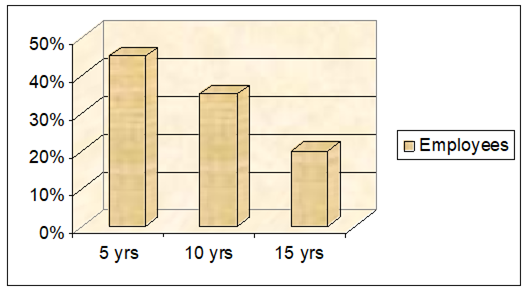
Section B: Respondents’ View
Question 6: Whether the Employees Are Familiar with the Issue of CSR or Not
The employees’ familiarity with the issues of corporate social responsibility would reflect the fact that their respective companies have a practice to comply with the CSR policies on a regular basis for which reason the companies want their workers to deal with the key concerns of CSR. The survey has revealed the fact that 95% of the employees are familiar with the issues of CSR whilst 5 % had lack of idea about CSR.

Result: A huge number of employees from different corporations around the US oil industry are aware about the issues of corporate social responsibility.
Question 7: Whether the Employees Think the US Oil Industry Should Have CSR-
90 % employees expressed positive attitude towards the adaptation of CSR by the US oil industry whilst the other 10 % have not found any necessity of CSR in the industry.
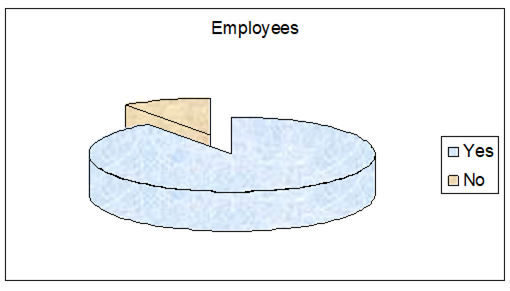
Result: The result shows the fact that the consciousness among the workers are increasing and most of them now see CSR as an important factor for the industry.
Question 8: Whether the Employees Think CSR Has Direct Link with Ethical Issues
85 % out of 60 respondents think CSR to have a direct link with ethical issues while the rest 15 % believes that CSR is a bogus concept, which under no circumstance can have any type of connection with ethics.

Result: According to the feedback of the employees, CSR indeed have necessary connections with ethical issues of a company.
Question 9: Whether the Employees Think CSR Is the Mechanism to Maximize Profit
The researcher has emphasized on this question to get real information from the employees of whether they have seen their respective companies to maximize profit by practicing CSR within the organizations. 65 % have reported that their companies have maximized profit through the mechanisms in CSR whilst 35 % observes no direct link between CSR and profit maximization.
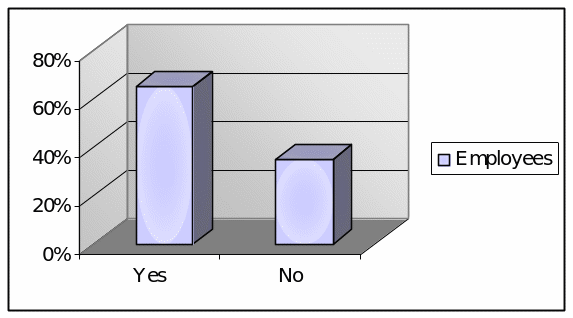
Result: Although a large number of employees agreed with the fact that CSR could maximize profit to a certain extent, still a significant number of them disagree with this fact.
Question 10: Whether the Employees Think Good Management of CSR Can Increase Confidence Level
70 % employees argued that good management of CSR could raise confidence level in the company whereas 25 % refused to this and the rest 5 % have not commented anything on this.
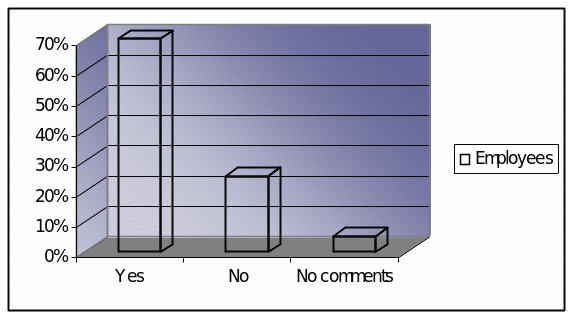
Result: As per the result of the respondents’ feedback, it can conclude that proper management of CSR could raise confidence level on an organization.
Section C
Question 11: To What Extent the Employees Agree That Lack of CSR Can Reduce Share Price of the Company
This question was put forward to the employees (as the companies’ representatives) to know the extent to which lack of CSR can reduce share price by giving birth to anti-corporate backlashes. 25 % have strongly agreed to this fact, 55 % have agreed, 5 % was neutral, whilst 10 % disagreed and the rest 5 % strongly disagreed.
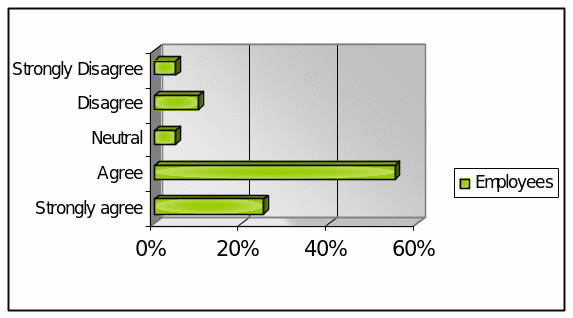
Question 12: To What Extent the Employees Agree That Lack of CSR Is One of the Main Reasons of Environmental Pollution
20 % have strongly agreed to the fact that lack of CSR is one of the main reasons to cause environmental pollution whilst 70 % have agreed, 5 % was neutral, 5 % disagreed, and none of the employees has strongly disagreed.
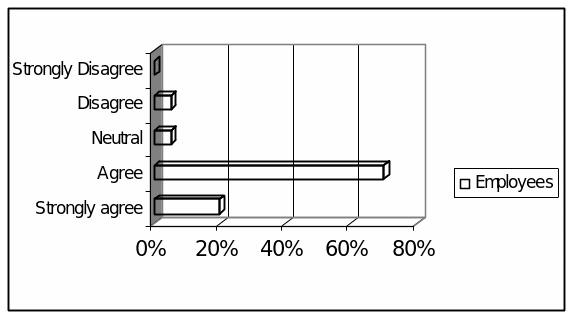
Question 13: To What Extent the Employees Agree That CSR Is the Competitive Advantage for Oil Industry
20 % employees strongly believe that CSR is a competitive advantage for the US oil industry whereas 45 % have agreed to this and 5 % was neutral. Amongst the rest 30 % employees, 25 % have disagreed to this and 5 % have strongly disagreed.
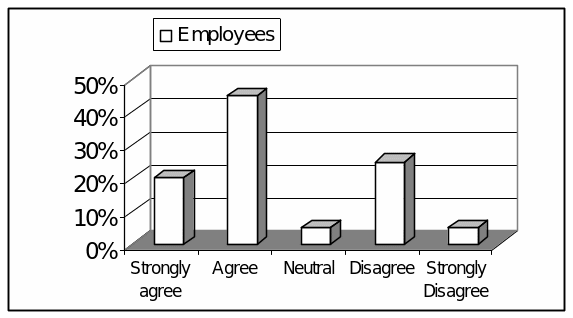
Question 14: To What Extent the Employees Agree That CSR Increases Efficiency Level of Stakeholders
45 % respondents think CSR to increase the efficiency level of stakeholders, 40 % think that there is no necessary connection between increasing efficiency level of stakeholders and CSR, whilst 15 % said that they are not interested to comment anything on this.
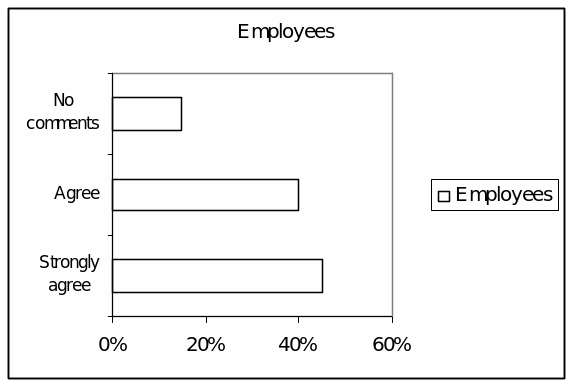
Question 15: To What Extent the Employees Agree That CSR Directly Impact on Reputation and Business Profit
Most of the employees have suggested that CSR in true sense can have direct impact over a company’s reputation and profit. Amongst 60 respondents, 70 % strongly agreed to the fact, whilst 25 % disagreed and the rest 5 % was neutral.
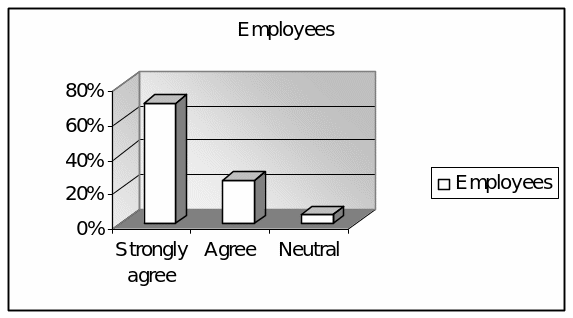
Section D
The additional comments of the employees of US oil industry has been modified and scrutinized by the researcher and placed in the recommendation as outcomes of the dissertation.
Table 3: Financial Performance of the Integrated US Oil Companies for 2007 (US$).
Corporate social responsibility becomes a big issue for profit generation for Oil Company when corporate irresponsibility displayed on the front page of newspapers, or large environmental disaster occurs, for instance, the case of the giant oil spill of Exxon Valdez, Piper Alpha disaster, BP’s BTC pipeline, the Trans Alaska pipeline, and BP oil spill in Gulf of Mexico. However, the following figure shows how the share price of BP has fallen due to oil spill in Gulf of Mexico –
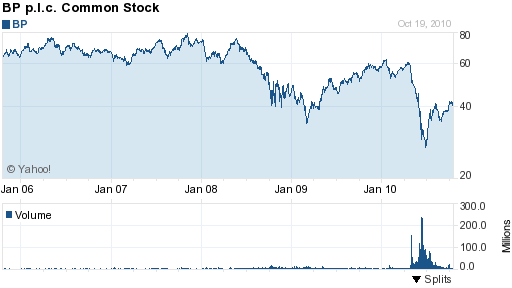
Conclusion
Recommendations
- The attitude of oil companies should change as the US oil companies are not yet come out from their pursuit of profit; therefore, they are harming the free societies with out their responsibility to the society when they are obliged to their shareholders and expected to their ultimate objective to maximizing the profit;
- Another most common criticism on CRS is that the economists of advanced block have repetitively stimulated their further polluted workshops and industries from their own country to other areas of the world where the ecological and social standards are low and people are backward; as a result, those parts of the world have been polluting on behalf of them who don’t care about CRS.
- British Petroleum (2009) reported that Safety, people and performance are BP’s top priorities and it constantly seek to develop its safety performance by the procedures, processes and training programs to ensure no harm to people and no damage to the environment. However, the practical scenario is that they failed to ensure safety of public health, and environment; thus, as a part of social responsibility, it should compensate properly though CP is the British originated company;
- It is too unfortunate that Oil companies use CSR only to maximize the profit instead of real sense of CSR and they do not take any corrective actions instantly; so US environmental protection Agency, Greenpeace, US Fish and Wildlife service, and other environmental protection Agencies should take more effective initiatives to impose pressure on oil companies to consider the CSR issues in practical sense;
- In addition, these environmental protection agencies should go for political and social movements to force the government to make effective rules and regulation though there have numerous regarding this issue but the management of large oil companies never response from the starting to ending phase of their company;
- From the discussion of the dissertation, CSR issue is still a subject of controversy in case of implementation of the responsibility; so there should have more research work to solve the present dilemma;
- Most of the respondents selected that CSR has direct connection with the reputation and the profit of the oil company as the share price can fall due to lack of responsibility and profit may minimize. Therefore, oil company should increase budget for the development of the CSR policy;
- Most of the US oil company is committed to pay compensation if any incident occur, but practically they try to escape this issue by applying various mechanism; for example –they argued that we are operating here but out parents company liable for the fault, so the jurisdiction of court and the situation of parent company become a vital factor for the accidental compensation case;
- Finally, management should increase accountability, confidential information channels should exist to make sure that crucial information reaches the top, the company’s media department may collaborate with the press to ensure early publication of the story would be less hostile and should follow sustainability reports, ethical guidelines and management control systems.
Conclusion
From the above qualitative data and quantitative data, it can be said that CSR has significance to maximize profit, develop reputation, increase share price, and so on. However, this paper would conclude that the Corporate Social Responsibility possibly would provide the dogmatic supports for the MNCs to engage their corporate practices restructuring the management trend to assist and pick up the legality of corporations where the US Oil companies have explored their devotion to lead their operation with consistency of CSR tools.
However, the American Oil industry is passing through the threats of climate change on CSR but the management of oil companies has engaged with strapping trend to uphold the regulatory framework of CRS with a positive approach. This dissertational effort also interviewed with some of the corporate representatives from US Oil companies and finds that most of the companies are focusing explicitly on the rewarding implication of CRS and endow with the insights into the comparative significance of company’s profitability.
Reference List
Boasson, E. L. (2009) On the management success of regulative failure: standardised CSR instruments and the oil industry’s climate performance. Journal of Corporate Governance, 9(3).
British Petroleum (2009) Annual Report and Accounts 2009. Web.
Carroll, A. B. (1999) Corporate Social Responsibility Evolution of a Definitional Construct. Business & Society, Vol. 38 (3). Web.
Cohen L., Manion, L. & Morrison, K. (2007) Research Methods in Education. 6th ed. New York: Routledge.
Corporate Watch (2010) The evolution of CSR. Web.
Godfrey,P. C., Hatch, N. W., & Hansen, J. M. (2010) Toward a General Theory of CSRs: The Roles of Beneficence, Profitability, Insurance, and Industry Heterogeneity. Business & Society, Vol. 49 (2). Web.
Husted, B. W., Allen, D. B., & Rivera, J. E. (2010) Governance Choice for Strategic Corporate Social Responsibility: Evidence From Central America. Business & Society, Vol. (49) 2. Web.
Kapoor, S., & Sandhu, H.S., (2010) Does it Pay to be Socially Responsible? An Empirical Examination of Impact of Corporate Social Responsibility on Financial Performance. Global Business Review, Vol. 11 (2). Web.
Mahon, J. F., & Griffin, J. J. (1999) Painting a Portrait: A Reply. Business & Society, Vol. (38) 1. Web.
Malhotra, N. K. (2009) Marketing Research- An Applied Orientation. 5th ed. Prentice-Hall of India Private Limited.
Manby, B. (2000) Shell in Nigeria: Corporate Social Responsibility and the Ogoni Crisis. Web.
Montiel, I. (2008) Corporate Social Responsibility and Corporate Sustainability: Separate Pasts, Common Futures. Organization & Environment, Vol. 21 (3). Web.
Orlitzky, M., Schmidt, F. L., & Rynes, S. L. (2003) Corporate Social and Financial Performance: A Meta-Analysis. Organization Studies, Vol. 24 (3). Web.
Pirog, R. (2008) CRS Report for Congress: Oil Industry Profit Review 2007. Web.
Roman, R. M., Hayibor, S., & Agle, B. R. (1999) The Relationship between Social and Financial Performance: Repainting a Portrait. Business & Society, Vol. 38 (1). Web.
Saunders, M., Thornhill, A. & Lewis., P. (2006) Research Methods for Business Students. 4th ed. London: FT Prentice Hall.
Sekaran, U. (2006) Research Method for Business. 4th ed. John Wiley & Sons, Inc.
Sen, S. K., & Swierczek, F. W. (2007) Societal, Environmental and Stakeholder Value Drivers: A Case Analysis of US and Asian International Firms. Journal of Human Values, 13 (2). Web.
Thomas, G., & Nowak, M. (2006) Corporate Social Responsibility: A definition. Web.
Tsoutsour, M. (2004) Corporate Social Responsibility and Financial Performance. Web.
Vaaland, T. I. & Heide, M. (2007) Managing corporate social responsibility: lessons from the oil industry. Emerald Group Publishing Limited, 13(2). Web.
Yahoo Finance (2010) Basic Chart of BP in NYSE. Web.
Yin, R. K. (2003) Case Study Research: Design and Methods. 3rd ed. Beverly Hills, CA: Sage.
Young, S. & Thyil, V. (2009) Governance, employees and CSR: Integration is the key to unlocking value. Asia Pacific Journal of Human Resources, Vol. 47 (2). Web.
Zikmund, W. M. (2006) Business Research Methods. 7th ed. Orlando: Harcourt Publishers.
Appendix 1
Questionnaire
Section A: (About the respondents)
- Your Name: _____________________
- Please select your sex:
- Male
- Female
- Please select your Company Name:
- BP
- Shell
- ExxonMobil
- Apache
- Other
- Please select your nationality:
- US
- Non US
- Please mention your Years of experience:
- Under five years
- between five and ten years
- More than Fifteen years
Section B: (designed to know employee’s view)
- Are you familiar with the issue of corporate social responsibility (CSR)?
- [Yes]
- [No]
- [No comments]
- Do you think the US oil Industry should have CSR?
- [Yes]
- [No]
- [No comments]
- Do you think CSR has direct link with ethical issues?
- [Yes]
- [No]
- [No comments]
- Do you think CSR is the mechanism to maximize profit?
- [Yes]
- [No]
- [No comments]
- Do you think good management of CSR can increase confidence level?
- [Yes]
- [No]
- [No comments]
Section C
- To what extent you agree that lack of CSR can reduce share price of the company?
- [Strongly Agree]
- [Agree]
- [Neutral]
- [Disagree]
- [Strongly Disagree]
- To what extent you agree that lack of CSR is one of the main reasons of environmental pollution?
- [Strongly Agree]
- [Agree]
- [Neutral]
- [Disagree]
- [Strongly Disagree]
- To what extent you agree that CSR is the Competitive advantage for Oil industry?
- [Strongly Agree]
- [Agree]
- [Neutral]
- [Disagree]
- [Strongly Disagree]
- To what extent you agree that CSR increases efficiency level of Stakeholder?
- [Agree]
- [Disagree]
- [No Comment]
- To what extent you agree that CSR directly impact on reputation and business profit?
- [Agree]
- [Neutral]
- [Disagree].